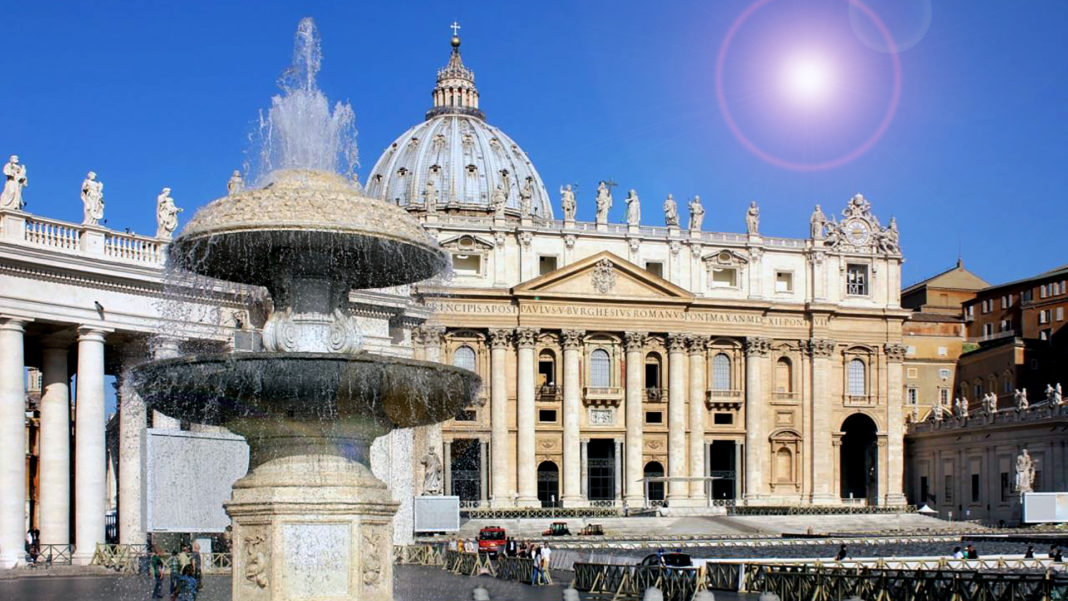‘The Devil works through children abused by priests’, former President Mary McAleese was told by senior Vatican officials.
In a new RTÉ documentary, Rome v Republic, to be aired this Thursday, former President McAleese says the then Vatican secretary of state Angelo Sodano, attempted in 2003 to secure an agreement with Ireland that it would not access church documents.
“I asked him why,” says Ms McAleese, “and it was very clear it was because he wanted to protect Vatican and diocesan archives. I have to say that I immediately said the conversation had to stop.”
Ms McAleese says the encounter with Cardinal Sodano left her ‘really quite shattered, that this was the number two (in the Vatican, after Pope John Paul II) in the church I belonged to’.
“There was nothing about him that was holy. There was nothing about him that was godly. There was nothing about him that was admirable. Everything about him I found horrifying.”
Rome v Republic is presented by Michael McDowell, and it traces the history of the Catholic Church in Ireland from the 18th century to the present day. McDowell was attorney general when Michael Woods, then minister for education, agreed the 2002 indemnity deal with 18 religious congregations which had run orphanages, reformatories and industrial schools. The deal saw the congregations pay €128 million in return for a State indemnity against all future legal actions by people who had been in institutions run by the Orders.
“The simple fact of the matter is that the result was that the State effectively signed a blank cheque which cost us €1.4 billion in the end, in exchange for a promise of a contribution of €128 million from the religious orders,” McDowell says.
17 years on, the 18 religious organisations have still not fulfilled the terms of the deal, and the terms of later offers made to the State. Of the €128 million the Orders agreed to pay, €4.21 million is still outstanding. Negotiations over the handover of remaining properties continue.
In the wake of the publication of the 2009 Ryan report, the18 congregations were called in by the then government and asked to increase their contributions to redress costs, the total cost of which came to €1.5 billion. Mr Justice Ryan had recommended the congregations pay half the cost of redress, with the taxpayer footing the rest.
The orders offered a further €352.61 million, and have so far paid (in cash and property) €103.17 million, or 29%.
Colm O’Gorman is founder and former director of the charity One In Four. He survived the most appalling clerical abuse, and he’s currently the executive director of Amnesty International Ireland.
“The original amount settled for was only 8.5% of the total costs of compensation process,” O’Gorman says. “And they haven’t even honoured it. It was agreed in 2002. 17 years later, €4.21m has yet to be paid.”
The redress scheme has cost Irish taxpayers €1.5 billion, with 15,579 people receiving an average of €62,250 each.
“Think about that for a moment,” says O’Gorman. “In our litigious, high award culture, victims of some of the most depraved acts of abuse, of torture and exploitation, received an average award of €62,250 each. What does that say about the attitude of both Church and State?”
Diarmuid Martin is the Catholic archbishop of Dublin, and he was singled out last year by Ian Elliott, former chief executive of the Irish Catholic Church’s National Board for Safeguarding Children. Elliott’s job had been to create child protection structures for the Catholic Church here, and he told The Irish Times he had experienced such resistance from bishops that he would not do the job over again.
Elliott said that of all of the Irish bishops, only one stood out as being genuinely committed to protecting children.
“Without a shadow of a doubt, that would be Archbishop Diarmuid Martin, because he had the courage of his convictions … I always felt he had the best interests of children and young people at heart and that he could not, in his conscience, come to terms with the fact that any member of the clergy could abuse a young person … he was outstanding.”
Diarmuid Martin is despised by the Irish Catholic conservatives, who perceive him as ‘liberal’. Martin features in McDowell’s documentary, and he says he knows of priests who abused so many children they could not be sure who they had, and had not, attacked.
“Still, cases come forward,” Martin says. “And my people will ask, for example, a priest if a new case comes up – one of these historical cases – does this name mean anything to you? Sometimes they say, ‘Yes, I abused that person’. Sometimes, and this is more worrying, ‘The name means nothing, but I can’t say. It could have happened.’ They don’t even know how many people they abused.
“Any organisation has to ask how it is, at a particular time, there was a large number of serial paedophiles. When I’m talking about serious paedophiles, we’re talking about hundreds.”
The claim by former President McAleese’s unnamed Vatican officials that ‘the Devil works through children abused by priests’, chimes with conversations I’ve had with defenders of the faith before, although those I’ve spoken with didn’t bother to outsource the blame to Satan, preferring instead to place the blame squarely and solely upon the victims. That speaks to me of a brand awareness on the part of Vatican officials, one perhaps not shared by their foot soldiers.
The current Pope is a big fan of the Devil – or at least he’s a big fan of talking about the Devil like he’s real. I wrote here before about Pope Francis’ spectacular rant in February about those who criticise the Catholic Church being ‘friends of the Devil’.
In that article, I mentioned that the Church has been harbouring child abusers since at least the 11th Century. In 1051, the Benedictine monk Saint Peter Damian, wrote Liber Gomorrihanus. In it, he railed against priests having sexual relationships with adolescent boys.
I mentioned too that Martin Luther in 1531 alleged Pope Leo X had vetoed a measure to limit the number of boys Cardinals could keep in servitude for the purpose of sexual abuse. Not that the Cardinals should not abuse those children, just that they should keep the numbers of children they abuse down to a modest few.
Colm O’Gorman says paedophilia has far deeper roots in Christianity than even the 11th century.
In an article in the Irish Independent, O’Gorman points out that the first laws to deal with sexual crimes perpetrated by priests were introduced in the fourth century, by the Council of Elvira.
If clerical child abuse dates back at least 1,700 years, then child abuse is the serpent coiled around the very roots of Christianity, and it’s not the suffering little children who are doing the work of the Devil.
Rome v Republic, 10.15pm RTÉ1, Thursday 11 April.
One In Four: 01 66 24070
Dublin Rape Crisis Centre 24-Hour National Helpline: 1800 778888








